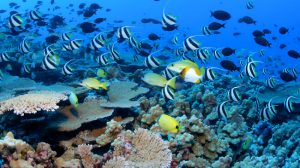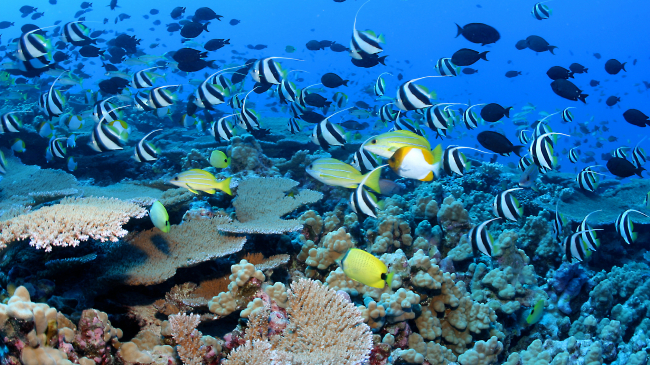Introduction As the sun-soaked beaches of Florida continue to draw in tourists and locals alike, a fascinating phenomenon is underway beneath the sparkling waters. The ocean temperatures along Florida’s coastlines are retreating from their previously warming trends. While this cooling might seem like a positive change, it conceals a host of challenges that persist for
Introduction
As the sun-soaked beaches of Florida continue to draw in tourists and locals alike, a fascinating phenomenon is underway beneath the sparkling waters. The ocean temperatures along Florida’s coastlines are retreating from their previously warming trends. While this cooling might seem like a positive change, it conceals a host of challenges that persist for the marine life that thrives within these vibrant waters. This article takes a deep dive into the complexities of Florida’s cooling oceans, the potential perils that continue to threaten marine life, and the influential voice of David Attenborough in the realm of marine conservation.
Understanding Florida’s Cooling Oceans
For years, the warming of our oceans has raised alarms among scientists and environmentalists. Yet, recent data shows that parts of Florida’s oceans are experiencing a counterintuitive cooling trend. This cooling is attributed to shifting oceanic patterns, which have disrupted the previously established temperature dynamics along the coastlines. This retreat in ocean heat is a complex interplay of currents, weather patterns, and atmospheric conditions, which scientists are striving to fully comprehend. While this cooling offers some respite from the relentless warming trend, it unveils a complex web of consequences for marine life.
2. The Hidden Perils for Marine Life
The cooling of Florida’s oceans might seem like a positive development, offering a break from the intensified heat stress that marine ecosystems have endured. However, this sudden cooling can be just as harmful as prolonged heat exposure. Marine life has adapted to the warming waters, and abrupt shifts in temperature can disrupt delicate ecosystems. Coral reefs, for instance, are incredibly sensitive to temperature fluctuations. A sudden cooling can lead to coral bleaching, a phenomenon that weakens and eventually kills the corals. Additionally, certain marine species that are more suited to warmer waters might be threatened by this temperature shift. This delicate balance underscores the complex relationship between temperature and marine biodiversity.

Image by: https://www.noaa.gov/education/resource-collections/marine-life
3. David Attenborough’s Marine Conservation Crusade
In the realm of marine conservation, few voices resonate as powerfully as that of David Attenborough. A natural historian and broadcaster, Attenborough’s documentaries, including “Blue Planet” and “Planet Earth,” have captured the imaginations of millions. His ability to blend awe-inspiring storytelling with scientific insights has brought marine life and conservation to the forefront of global conversations. Through his lens, viewers have witnessed the breathtaking beauty of coral reefs, the majesty of marine mammals, and the fragility of underwater ecosystems. Attenborough’s impactful narration has succeeded in bridging the gap between scientific research and public awareness.
4. Navigating the Nexus of Science and Conservation
Effective marine conservation necessitates the seamless integration of scientific research and practical interventions. Success stories abound, showcasing the positive outcomes when science meets conservation efforts. One such example is the restoration of damaged coral reefs through the establishment of artificial coral reefs. These man-made structures provide habitats for marine species and aid in revitalizing deteriorated ecosystems. Another innovative approach involves ocean current manipulation, where localized temperature control can help protect vulnerable marine life. These examples underline the significance of combining scientific knowledge with tangible conservation actions.
5. A Call to Action: Preserving Florida’s Marine Legacy
Each individual holds the power to make a significant impact on marine conservation. By adopting sustainable practices in our daily lives, we contribute to the preservation of Florida’s marine legacy. Simple actions such as reducing single-use plastics, supporting responsible fishing practices, and participating in beach clean-up initiatives collectively create a positive ripple effect. The choices we make today directly influence the future health of our oceans and the diverse life forms they house.
6. Rising Trends in Oceanic Temperature Regulation
In the pursuit of a balanced marine ecosystem, scientists and researchers are exploring innovative technologies to regulate oceanic temperatures. Artificial coral reefs, for instance, not only provide shelter for marine life but also contribute to localized temperature regulation. Additionally, researchers are investigating methods to manipulate ocean currents, directing cooler waters to areas at risk of overheating. These cutting-edge solutions hold the potential to mitigate the adverse effects of both warming and cooling trends, creating a more stable environment for marine life to thrive.
Key Insights in a Glance: Florida’s Oceanic Evolution
| Aspect | Description |
|---|---|
| Oceanic Temperature Shift | The cooling trend along Florida’s coastlines |
| Impact on Marine Life | Consequences of prolonged heat exposure on marine ecosystems |
| David Attenborough’s Impact | How his documentaries have highlighted marine conservation |
| Science-Conservation Nexus | Successful interventions where science meets conservation |
| Personal Conservation Steps | Everyday actions to contribute to marine conservation |
| Innovative Temperature Tech | Cutting-edge approaches to regulate oceanic temperatures |
Comparative Overview: Conservation Strategies
| Strategy | Benefits | Challenges |
|---|---|---|
| Artificial Coral Reefs | Habitat revival for marine species | Maintenance and sustainability |
| Ocean Current Manipulation | Temperature control in specific areas | Ecological disruptions |
| Sustainable Fishing Practices | Preservation of fish populations | Resistance from industrial fishing |
| Plastic Waste Reduction | Marine life protection from pollution | Global plastic usage habits |
Meet the Mind Behind the Message: David Attenborough
David Attenborough, a revered natural historian and broadcaster, has dedicated his life to uncovering the mysteries of our planet’s marine ecosystems. With an unparalleled ability to blend captivating storytelling and scientific insights, Attenborough’s documentaries have ignited global awareness about the importance of preserving our oceans. Through works like “Blue Planet” and “Planet Earth,” Attenborough beckons us to recognize the perilous state of our oceans and actively engage in conservation efforts.
In Conclusion
As ocean temperatures in Florida recede, they reveal both hope and challenges for marine life. The work of individuals like David Attenborough demonstrates the power of communication in driving conservation action. By embracing sustainable practices and supporting innovative solutions, we can be stewards of Florida’s marine legacy, ensuring that its beauty thrives for generations to come. Let us all become ambassadors for our oceans, spurred by the wisdom of Attenborough and the promise of a healthier, cooler marine world.

















Leave a Comment
Your email address will not be published. Required fields are marked with *